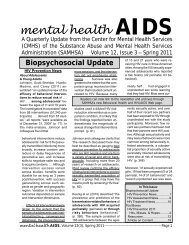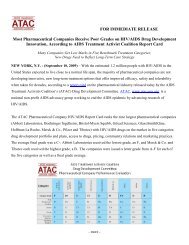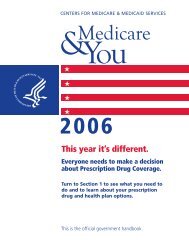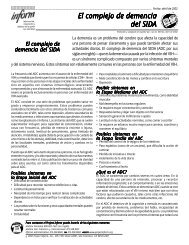HeAlTH INFormATioN & VieWs - CD8 T cells - The Body
HeAlTH INFormATioN & VieWs - CD8 T cells - The Body
HeAlTH INFormATioN & VieWs - CD8 T cells - The Body
You also want an ePaper? Increase the reach of your titles
YUMPU automatically turns print PDFs into web optimized ePapers that Google loves.
HIV treatment can be a lifesaver, but before you start,<br />
you’ll want to be mentally and emotionally prepared.<br />
ost people with HIV start taking HIV<br />
treatment (sometimes called antiretroviral therapy, ART or<br />
HAART) sooner or later. Maybe you are preparing to start, or<br />
maybe you know someone who is. Part of getting ready is<br />
thinking about how treatment may affect your life. Here we<br />
suggest some questions to consider. Two HIV-positive<br />
women share their stories of walking the HIV treatment<br />
road. And a handy ART Start Checklist identifies some of the<br />
issues you may face when starting treatment.<br />
why are you starting HIv treatment?<br />
HIV treatment reduces the amount of HIV in the body,<br />
allowing the immune system to partially recover. More<br />
importantly, by taking ART and staying on ART, your chances<br />
of living for many years are tremendously increased. We are<br />
now learning that ART can lower the risk of HIV passing to<br />
sex partners in certain situations. For some people with HIV,<br />
this is a reason to start treatment. But the most important<br />
reason to start treatment is to maintain your health.<br />
what does HIv treatment mean to you?<br />
Treatment can mean different things to different people.<br />
You may see the need to start treatment as a sign that your<br />
health has deteriorated. Or you may think of treatment as<br />
a positive step that you’re taking to maintain or improve<br />
your health.<br />
will you be able to take medication on a regular,<br />
ongoing basis?<br />
To keep your treatment working, you must stick to your<br />
pill-taking schedule (this is called adherence). Skipping<br />
doses can lead to drug resistance, which will cause your<br />
treatment to stop working and, ultimately, will limit your<br />
treatment options. Before you start, you want to be sure<br />
that you’re ready to take pills every day as directed.<br />
Have you thought about the ways your pill-taking<br />
schedule may affect your daily life?<br />
Taking medication on a daily basis will have an effect on<br />
your life and your lifestyle. Think about your daily routine<br />
and whether you’ll have to make any changes to accommodate<br />
your pill-taking schedule.<br />
what about work and social situations?<br />
Who knows your HIV status? Could taking meds or having<br />
them around your home or workplace reveal your status<br />
to anyone? If this could be a problem, think about how<br />
you might be able to manage it.<br />
Do you know the possible side effects of the<br />
antiretroviral drugs you will be taking? will you<br />
be able to deal with them?<br />
Side effects don’t affect everyone the same way—for<br />
some people, they may be barely noticeable, but for others,<br />
side effects can interfere with daily life. Look at the most<br />
likely side effects of the drugs you’re considering. Are you<br />
more worried by the prospect of some side effects than<br />
others? Before starting treatment, try to learn as much as<br />
you can about these side effects and how to cope with<br />
them. Usually, there is quite a bit you can do. <strong>The</strong> good<br />
news is that medications commonly prescribed today for<br />
people starting treatment are generally well tolerated.<br />
How will you pay for treatment?<br />
Antiretroviral drugs are expensive. Some people with<br />
HIV have private insurance, often through their job, that<br />
can cover some or all of the costs of antiretroviral drugs.<br />
Other people rely on provincial or territorial assistance programs<br />
to cover their prescription drug costs. Talk to your<br />
doctor and your pharmacist about this issue. You can also<br />
check out Federal, Provincial and Territorial Drug Access<br />
Programs at www.catie.ca.<br />
Feel free to discuss these questions with your doctor. You<br />
could even take the ART Start Checklist (on page 25) to an<br />
appointment and use it to discuss your treatment options.<br />
For more information about starting and staying<br />
on HIV treatment, check out A Practical Guide to<br />
HIV Drug Treatment at www.catie.ca. You can<br />
also order print copies through the CATIE Ordering<br />
Centre at www.catie.ca or 1.800.263.1638.<br />
<strong>The</strong> guide is free for people in Canada.<br />
Summer 2012 THE POSITIVE SIDE<br />
23

















